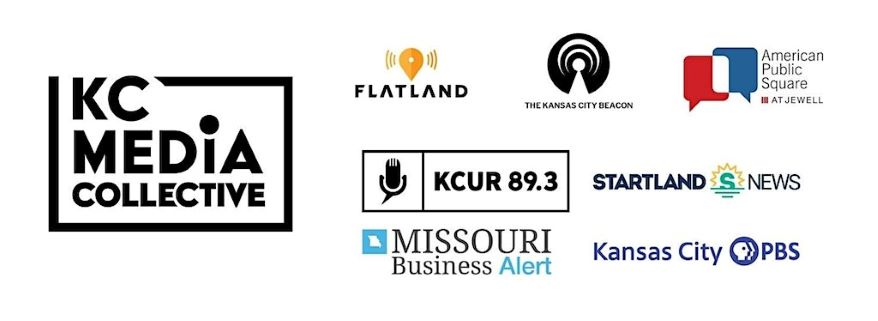To Navigate Car-Dominated Kansas City, These Congolese Refugees Teach Each Other How to Drive Accessing a Future
Published September 1st, 2023 at 6:00 AM
Above image credit: Justin Bilombele (left) and Amuri Justin (right) are stand outside of the car in Kessler Park, where Bilombele taught Justin how to drive. (Noah Zahn | KCUR 89.3)Justin Bilombele used to go on walks through Kessler Park in northeast Kansas City. It reminded him of scenes he would see when he lived in Africa, just with smaller trees.
Overlooking the city, the historic park is overgrown, with a bumpy, concrete road winding through. It’s not particularly crowded most days — you won’t find many joggers or dog walkers — which makes it a great place to teach people how to drive.
“We always come here, it’s safe,” Bilombele said. “Everybody comes here.”
It’s here that Bilombele taught himself how to drive, soon after he arrived in the city as a refugee nearly 12 years ago. Now he’s passing on the favor to newer refugees.
“We’re kinda like the first Congolese family to be in Kansas City,” Bilombele said. “In some sense, I feel an obligation to teach people who come, just so you don’t have to go through the same issues I had to go through.”
On this particular afternoon, Bilombele is sitting in the passenger seat of his silver Ford Fusion. It’s an unbearably hot day out, and the AC is turned on full blast.
Behind the wheel is Amuri Justin, a fellow Congolese refugee who moved to Kansas City a year ago. He’s practicing wide turns, parking and — the hardest part — U-turns.
Bilombele usually takes his driving students around the loop four or five times until they’re comfortable. Then it’s time to head for more crowded streets.
‘You Need a Car, Everywhere’
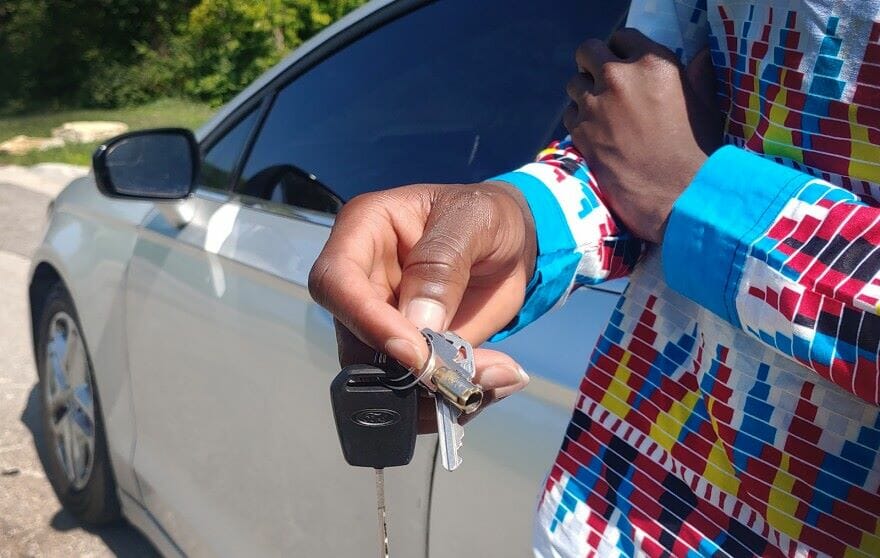
When refugees arrive in the United States, they face significant challenges to fit into their new environment, wherever that might be — learning different laws, cultures and languages.
But in car-dominated places like Kansas City, refugees have another challenge to surmount: transportation.
“Where we come from, you don’t need a car to go from places. You just get a bicycle or you can walk. And it’s fine,” Bilombele said. “But here, you need a car, everywhere. For job, for work, to go to the store, to go anywhere. Literally.”
Sam Nemeh is a board member for Jewish Vocational Services (JVS), a refugee resettlement agency in the Kansas City area. He’s lovingly known as “Uncle Yasser” in the Syrian community, and has helped many refugees find their new homes around Independence Avenue in northeast Kansas City.
“One of the intentions of JVS is to put the populations in a place where they have access to buses and small businesses,” Nemeh said.
That part of the city has become a center for refugee communities, because they are able to walk to the Social Security office, shops, family services and the health clinic.
Where they can’t walk, many refugees depend on public transportation systems to get to their jobs, school, the doctor’s office or the grocery store. But Kansas City’s buses are notoriously unreliable.
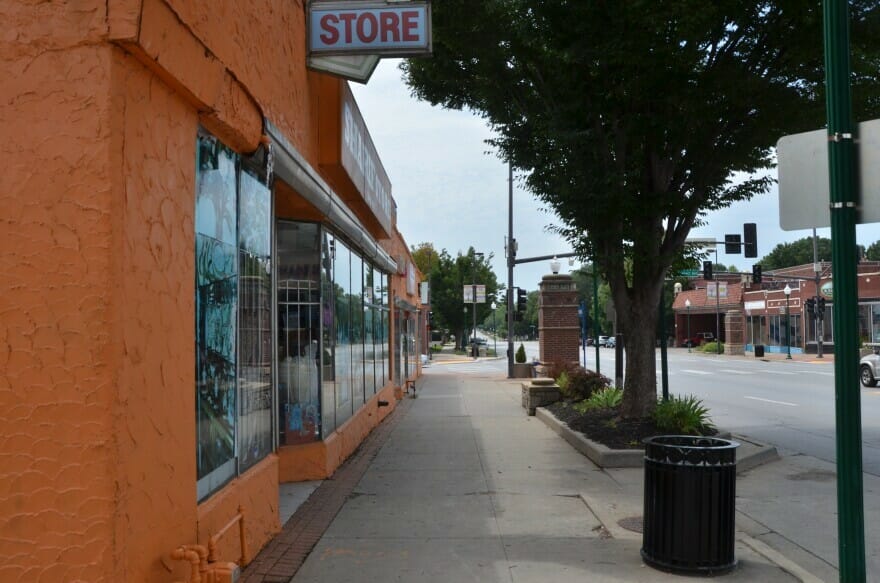
To get almost anywhere, a car is a necessity. Getting a driver’s license in the first place is no easy task, though, especially if there’s a language barrier.
“I mean, how can you come to a city not knowing anybody,” said Sofia Khan, founder of KC 4 Refugees, “and trying to figure out, in your state, ‘how do you get a license?’”
In both Missouri and Kansas, you need to pass both a written exam and a hands-on portion of the driver’s test. Both states also require written and vision tests for a learner’s permit, as well as documentation like a Society Security number and proof of residence.
The written tests can be translated to a variety of languages for a fee. In Missouri, translation services are contracted through the Global Village Language Center. The driving section is only offered in English in both states.
Only when the instructor deems that the driver cannot pass the test solely because of a language barrier can it be offered in another language.
Other cities in the Midwest, like St. Louis and Omaha, have formal programs run by local nonprofits to help refugees get behind the wheel. But there’s nothing like that in Kansas City.
Hopping Behind the Wheel
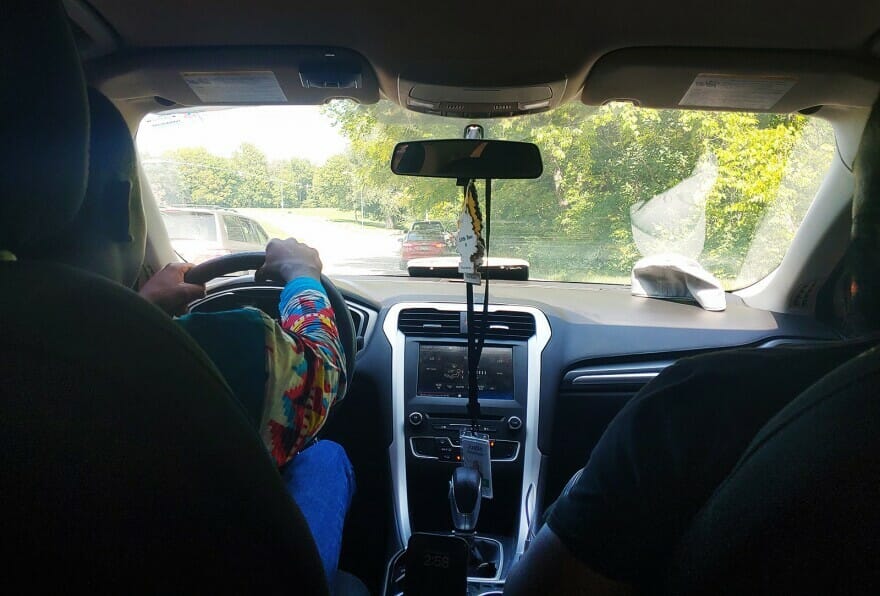
Bilombele remembers how cold it was when his family came to Kansas City in October 2012. After spending most of his life in Zambia, Bilombele wasn’t used to autumn in the Midwest.
Like millions of other Congolese refugees, Bilombele’s parents fled the Democratic Republic of Congo in 1998 after war broke out across the country. Bilombele was born in a refugee camp in Tanzania, but he still sees the DRC as his home, and its people as his community.
“The first month or two we spent in the house,” Bilombele said. “We couldn’t go outside.”
Although they had a television, Bilombele only remembers being able to tune in to the Spanish-language channels, although nobody in his family speaks Spanish.
Over time, they started meeting other African families — one from Rwanda, and another from the DRC who settled in Kansas.
“We started finding people here and there,” Bilombele said. “Next thing you know, 12 years in, everyone is everywhere.”
At Kuomba United Methodist Church on Hardesty Avenue, where Bilombele’s mother is the pastor, the largely Congolese congregation thrives on supporting each other. That’s how he met Amuri Justin.
When Justin arrived in Kansas City, he also didn’t speak English very well. As a senior at East High School, he took the bus to class, and asked for rides from his family.
“Anytime I was meeting an appointment or wanna meet with somebody, I’d have to ask my brother,” Justin said. “Like, ‘Hey I wanna go to this place, hey I wanna go to this place.’”
That changed when Justin graduated in May and set his sights on attending university. He spent the summer practicing driving with Bilombele, who was able to instruct him in his native Swahili.
Although Justin is fluent now, there are few opportunities to learn driving if you don’t speak English. Explaining how to parallel park, for example, requires pretty complex instructions: How to line up the car, go in reverse and turn the car into the correct spot.
While JVS does not offer any formal driver’s eduction classes, Nemeh has taught quite a few refugees to drive himself, even when it gets a little risky.
He’s also helped many refugees to find their first vehicle — although affording it, let alone the insurance, is another high barrier — and will get calls at all hours of the night with questions about cars or legal advice.
Bilombele didn’t have such a resource for his own education. “For me, when I was learning how to drive, I literally just took my dad’s car and then drove it when he wasn’t there,” he said.
Bilombele said that unlicensed driving is widespread in his community, because people still need to get around.
“You need to drive but you can’t pass a test. What are you gonna do? Stay home? No, you’re gonna get kicked out,” Bilombele said.
Unlicensed driving is a crime for anyone, but it’s even riskier for refugees.
“Definitely we tell them not to do that,” Nemeh said. “I mean, it’s a no-no. To skip over it, god forbid, what if you have a car accident? What if you hit somebody? That’s a felony now, you’ve lost your pathway to citizenship.”
Fighting Fears
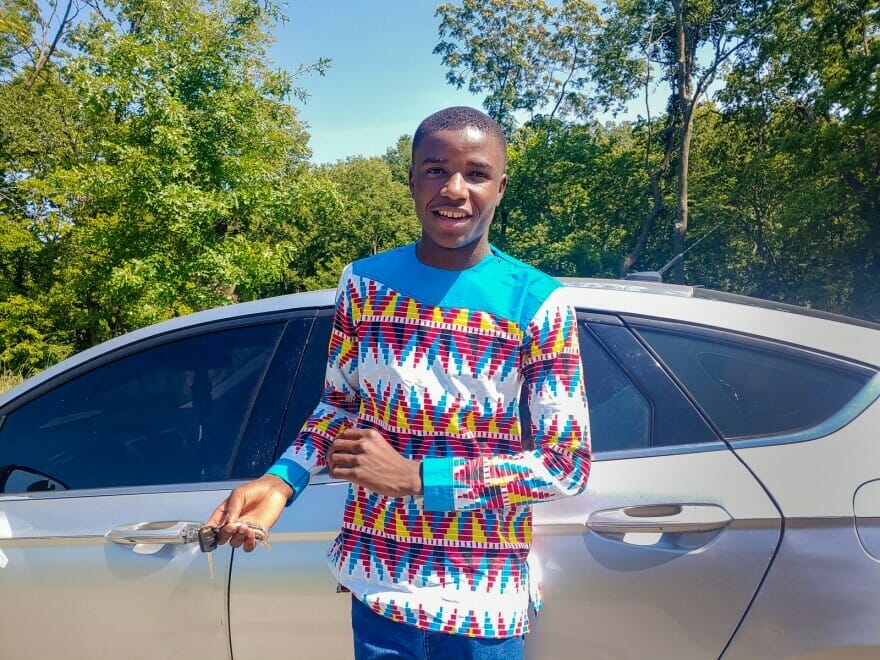
It’s those stakes, as much as anything, that Bilombele and Justin say keeps people from trying — especially for groups who are cautious of the government, after fleeing persecution in their home countries.
“The biggest thing is fear,” Bilombele said.
“A lot of us, we are cowards,” Justin adds. “We are so afraid, not even gonna do the test.”
Bilombele said he knows someone who has been in Kansas City for 20 years and still doesn’t have a driver’s license. “They tried, they tried. And it didn’t work out so now they don’t even try anymore,” he said.
In Missouri, if you fail the driver’s test three times, you cannot take it again unless you have written permission from the Department of Revenue.
A few weeks ago, Justin finally passed the test on his third attempt. He now drives himself the 17-minute commute to Donnelly College in Kansas City, Kansas, where he attends on a full ride scholarship.
He’s also encouraging other refugees in his community, like his friend who’s been driving on a permit for two years, to make the leap and take the test.
“When I showed him my license,” Justin said, “he was surprised. ‘How did you get this?’ he said. I told him, ‘I just do, go and do it.’”
This story was produced through a collaboration between KCUR and the Missouri Business Alert, powered by the KC Media Collective. Noah Zahn is the summer 2023 news intern for KCUR and the Missouri Business Alert. Teagan King of Flatland contributed reporting.
